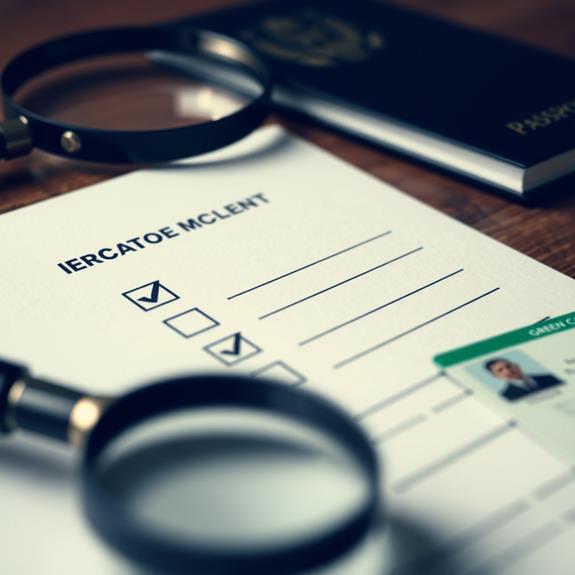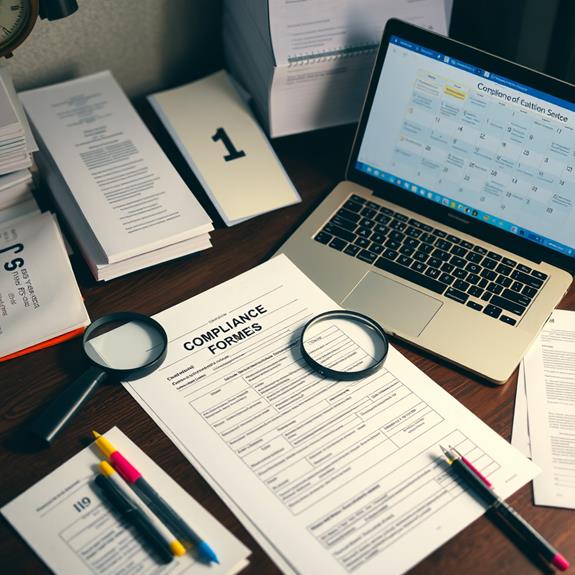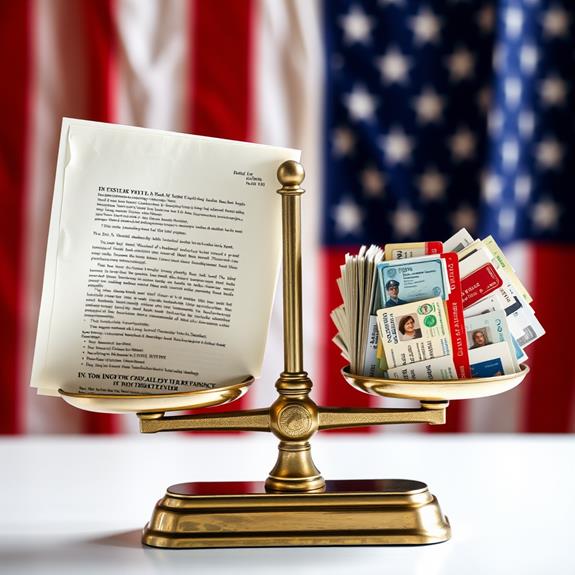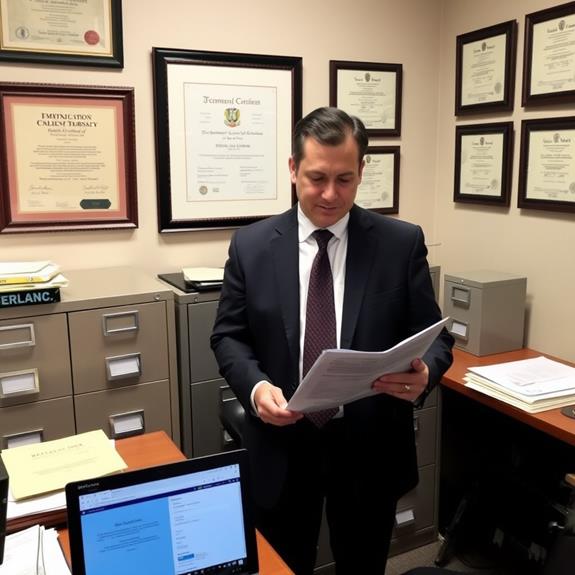An I-9 compliance attorney helps you navigate the complex world of employment eligibility verification. They'll guide you through proper I-9 form completion, conduct internal audits, and address violations. These lawyers represent employers during ICE inspections and train HR staff on compliance. They're experts in handling discrimination issues related to I-9 processes and can help you implement electronic systems. Your attorney will assist with E-Verify procedures, update policies, and resolve document retention challenges. They guarantee you're following all legal requirements, minimizing risks, and maintaining a fair hiring process. Exploring their services further can reveal additional ways they protect your business interests.
Understanding I-9 Form Requirements

Every U.S. employer must complete and retain an I-9 form for each employee they hire. This form verifies an employee's identity and work authorization in the United States. Understanding I-9 documentation essentials is vital for employers to avoid legal issues and penalties.
The I-9 verification process involves three main sections. In Section 1, the employee provides personal information and attests to their work eligibility status. For Section 2, you'll need to examine the employee's identity and work authorization documents. These must be original and unexpired. Common acceptable documents include a U.S. passport, permanent resident card, or a combination of a driver's license and social security card.
You must complete Section 2 within three business days of the employee's start date. Section 3 is used for reverification or rehires. It is essential to recognize that you can't specify which documents an employee must provide, as long as they're on the list of acceptable documents.
Remember to keep I-9 forms for all current employees and for terminated employees for either three years after their hire date or one year after their termination date, whichever is later.
Conducting Internal I-9 Audits
Proactively conducting internal I-9 audits can help your company stay compliant and avoid costly penalties. These audits are a significant part of your overall compliance strategy. To get started, establish a regular audit frequency, such as annually or semi-annually. Create a thorough compliance checklist to guide you through the process.
When conducting audits, review your I-9 forms for completeness and accuracy. Verify that all necessary documents are present and properly recorded. Use audit tools or compliance software to streamline the process and guarantee consistency. Pay attention to the audit scope, making sure you're examining all required elements.
After completing the audit, analyze your findings carefully. Identify any patterns or recurring issues that need addressing. Use this information to improve your employee training programs and document verification procedures. Don't forget to take into account the legal implications of your audit results.
Addressing I-9 Violations

Discovering I-9 violations during an internal audit is just the first step. As an I-9 compliance attorney, you'll need to address these issues promptly to minimize legal consequences and guarantee ongoing immigration compliance. Your role involves developing effective compliance strategies and implementing audit best practices to manage risks associated with employee verification.
When addressing I-9 violations, focus on these key areas:
- Document errors: Identify and correct mistakes in Form I-9 completion, such as missing signatures or incorrect dates.
- Training sessions: Conduct regular workshops for HR staff to improve their understanding of employer responsibilities and proper I-9 procedures.
- Policy updates: Revise company policies to align with current immigration laws and regulations.
You'll work closely with employers to create a thorough risk management plan. This includes reviewing and updating existing verification processes, implementing new compliance strategies, and addressing any systemic issues that may have led to violations. By taking a proactive approach, you'll help organizations maintain proper I-9 documentation and reduce the likelihood of future violations. Remember, consistent adherence to immigration compliance is vital for avoiding penalties and maintaining a legally sound workforce.
Representing Employers During ICE Inspections
Occasionally, employers face Immigration and Customs Enforcement (ICE) inspections, and as an I-9 compliance attorney, you'll play an important role in representing them. Your job is to guide clients through the inspection process, ensuring they're prepared and protected. You'll develop employer strategies to maintain compliance and minimize risks.
Inspection preparedness is vital. You'll help clients organize their I-9 forms and supporting documents. This includes reviewing files for accuracy and completeness. You'll also provide legal representation during the audit, acting as a buffer between ICE and your client.
When responding to audits, you'll assist in crafting thorough and timely responses. You'll advise on documentation best practices to avoid future issues. Compliance training for HR staff is another key service you'll offer. This helps clients stay up-to-date on regulatory updates and maintain proper procedures.
During inspections, you'll manage employee communications, ensuring your client's workforce is informed without causing unnecessary alarm. Your expertise in I-9 compliance will be invaluable in maneuvering through these complex situations, protecting your clients' interests, and helping them maintain a legally compliant workforce.
Training HR on I-9 Compliance

Training HR personnel on I-9 compliance is a vital responsibility for I-9 compliance attorneys. You'll work closely with HR teams to develop effective I-9 training techniques and implement HR compliance strategies. Your goal is to guarantee that HR staff understand the complexities of I-9 documentation and can maintain compliance with federal regulations.
When training HR on I-9 compliance, you'll focus on three main areas:
- Form completion: Teach HR how to accurately fill out I-9 forms, including common pitfalls to avoid.
- Document verification: Explain the proper methods for examining and verifying employee identification and work authorization documents.
- Record keeping: Instruct HR on proper storage, retention, and disposal of I-9 forms.
You'll use various training methods to reinforce these concepts, such as interactive workshops, online modules, and hands-on practice sessions. It's essential to stay updated on the latest I-9 regulations and incorporate them into your training programs. By providing thorough I-9 training, you'll help HR teams minimize errors, reduce the risk of penalties, and maintain a compliant workforce.
Implementing Electronic I-9 Systems
The implementation of electronic I-9 systems is a crucial step in modernizing and streamlining I-9 compliance processes. As an I-9 compliance attorney, you'll guide employers through this change, guaranteeing they meet all legal requirements while benefiting from improved efficiency.
When implementing an electronic I-9 system, you'll need to take into account several key factors. First, verify the system complies with federal regulations for electronic storage and user access. The system should securely store I-9 forms and supporting documents while allowing authorized personnel to retrieve them easily.
You'll also need to assess the system's features, such as automatic error checking, integration with E-Verify, and reporting capabilities. These tools can help reduce errors and simplify audits. Additionally, you'll want to evaluate the system's user-friendliness and compatibility with existing HR software.
Once you've selected a suitable system, you'll oversee its implementation. This includes training HR staff on proper usage, establishing protocols for data entry and maintenance, and creating backup procedures. You'll also need to develop policies for system access and security to protect sensitive employee information.
Handling I-9 Discrimination Issues

I-9 compliance attorneys play a crucial role in addressing discrimination issues that may arise during the employment eligibility verification process. They help employers navigate the complex laws surrounding I-9 forms and guarantee fair treatment of all job applicants and employees. These attorneys are well-versed in I-9 discrimination cases and can provide guidance on avoiding bias in hiring practices.
When handling I-9 discrimination issues, an I-9 compliance attorney will typically:
- Review company policies and procedures
- Conduct I-9 bias training for HR staff and managers
- Investigate any allegations of discrimination
You'll find that these attorneys can help you create a fair and consistent I-9 verification process. They'll advise you on how to avoid asking for specific documents based on an employee's national origin or citizenship status. They'll also guide you in treating all employees equally during the verification process, regardless of their appearance or accent. By working with an I-9 compliance attorney, you can reduce the risk of facing discrimination claims and guarantee that your company follows all relevant laws and regulations.
Navigating E-Verify Procedures
E-Verify navigation can be a complex process for many employers, and this is where an I-9 compliance attorney's expertise becomes invaluable. They'll guide you through E-Verify best practices, ensuring your company stays on the right side of the law. These attorneys understand the E-Verify compliance challenges you might face and can help you overcome them efficiently.
An I-9 compliance lawyer will assist with E-Verify system integration, making sure it works smoothly with your existing HR processes. They'll also help develop E-Verify training programs for your staff, ensuring everyone knows how to use the system correctly. As E-Verify policy updates occur, your attorney will keep you informed and help you adjust your procedures accordingly.
You'll benefit from their knowledge of common pitfalls and how to avoid them. They can review your E-Verify procedures, identify potential issues, and suggest improvements. With their help, you'll navigate the E-Verify process more confidently, reducing the risk of errors and penalties. Your attorney will be your go-to resource for all things E-Verify, helping you maintain compliance and peace of mind.
Updating I-9 Policies and Procedures

Keeping up with I-9 compliance requires regular updates to your company's policies and procedures. As an I-9 compliance attorney, you'll need to stay informed about the latest changes in employment verification laws and regulations. This knowledge will help you guide your clients in implementing I-9 policy updates and compliance best practices.
To guarantee your clients maintain proper I-9 compliance, focus on these key areas:
- Review and update I-9 forms regularly
- Train HR staff on new procedures and requirements
- Implement a system for tracking I-9 expiration dates
When updating I-9 policies, consider incorporating electronic I-9 systems to streamline the process and reduce errors. You'll also want to establish clear guidelines for handling remote hires and reverification procedures. Additionally, create a plan for conducting internal audits to identify and correct any compliance issues before they become problematic.
Remember to communicate these updates clearly to all relevant staff members. Provide written documentation of new procedures and offer training sessions to guarantee everyone understands their responsibilities. By staying proactive and thorough in your approach to I-9 compliance, you'll help your clients avoid costly penalties and maintain a legally sound workforce.
Resolving I-9 Document Retention Challenges
Document retention poses significant challenges for employers when it comes to I-9 compliance. Proper I-9 document organization is vital to guarantee you can quickly access and review forms when needed. You'll need to develop a system that allows for easy retrieval while maintaining the security of sensitive information.
Understanding I-9 retention timelines is essential. You must keep I-9 forms for all current employees throughout their employment. For terminated employees, retain their forms for three years after the hire date or one year after termination, whichever is later. It's important to implement a process for regular reviews and purging of outdated forms.
To resolve retention challenges, consider implementing electronic storage systems that comply with Department of Homeland Security regulations. These systems can help you manage retention periods, automate document destruction, and maintain proper organization. You'll also need to train your staff on proper handling and storage procedures to uphold compliance. Regular audits of your retention practices can help identify and address any issues before they become problems. By taking these steps, you'll be better equipped to handle I-9 document retention challenges effectively.

